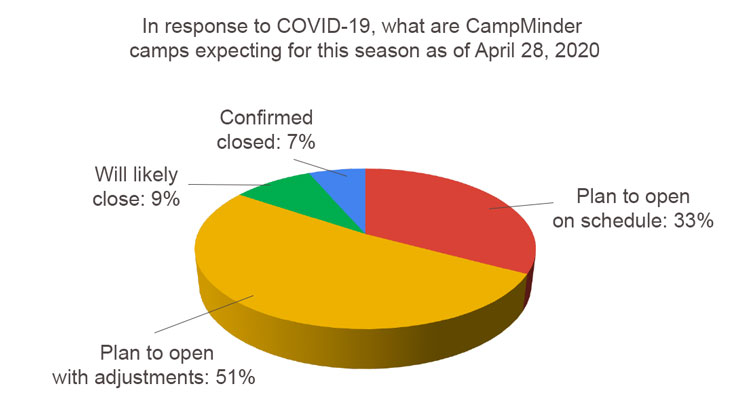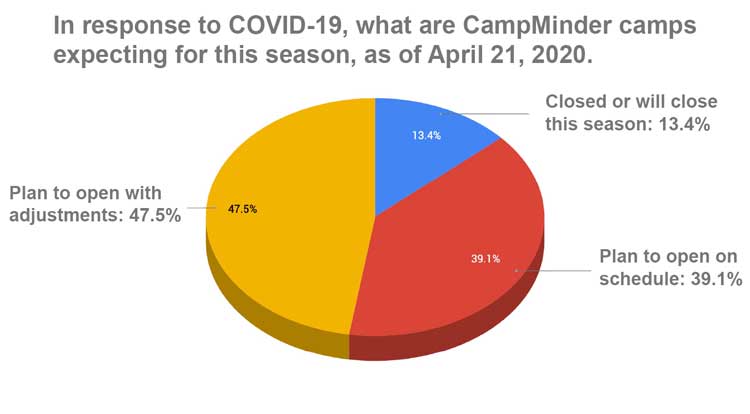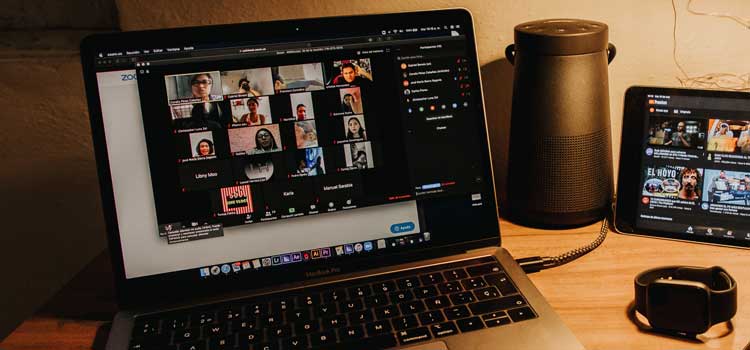UPDATE April 28, 2020: The CampMinder Crisis Management Team has now spoken with more than 350 camp directors and leaders about their plans for this summer. Roughly three quarters of these camps are residential camps, with the other quarter representing day camps. The pie chart below shows the latest information on camp statuses as of April 28, 2020.

Right now, 80% of camps plan on opening this summer
Most of the camps we’ve spoken with are leaning in one of four main directions for this summer:
- 114 plan to open on schedule (30% of residential camps and 36% of day camps).
- 178 plan to open with adjustments (48% of residential camps and 54% of day camps).
- 31 total camps have reported that they are likely closing for this season.
- 24 camps have already cancelled operations for the summer of 2020.
Most camps will be making the final call by mid-May
Many camps have also given us information about when they expect to make final decisions about their course of action for this summer. Of those who have settled on a specific time frame:
- 59 camps expect to make the call on or before May 2.
- 90 camps are planning to make their decision between May 10 and May 16
- 40 camps expect to decide between May 31 and June 6.
There are regional differences when it comes to what camps are deciding to do this summer
- In the southeastern region, 69% are planning to run with adjustments to their planned schedules.
- The southwest represents a smaller sample size among our calls, but ten out of 24 camps we connected with plan to adjust their schedules this year.
- Of the camps in the northeast that we’ve spoken with, 50 are planning to operate on schedule, 70 with adjustments, and 19 have decided to close.
- In the midwest, 29 of the 52 camps we talked to are planning to run with an adjusted schedule.
- We’ve checked in with 39 camps in the pacific region and found that 17 of those are planning to operate with an adjusted schedule, while eight have chosen to close for the summer.
- Seven of the Rocky Mountain camps we’ve reached are planning to operate on schedule, compared to nine that hope to run with an altered plan.
As expected, enrollments are lagging for now
Following up on our previous update about enrollments and cancellations, the latest numbers show that enrollments are down 18% and cancellations are up 35% compared with 2019, which includes all registrations from camps that have decided not to run this summer. We’ll be watching this closely as camps make their final decisions. We still believe that there may be a rush of late enrollments.
We know how important it is for camp directors to see how other camps are choosing to proceed. We will continue to update the information here as new trends emerge and as we gather new data.
Editor’s Note: The original version of this post was published on April 22, 2020, and the data below reflects the information we had gathered up to that date. The information above represents new data, however we wanted to keep our original content and charts for those interested in viewing camp director feedback over time.
As a summer camp community, we are getting through the challenging times brought upon by COVID-19 by leaning on and learning from one another.
In these unprecedented circumstances we’re all attempting to find our paths forward – though at this point the trail may seem foggy at best. To supplement the incredible amount of information being shared on COVID-19+Camp Slack and the Summer Camps and COVID-19 Facebook group we’re tapping into our greatest resource here at CampMinder: the 900+ camps that make up our community of clients.
We’ve temporarily transformed our Client Success Team into a Crisis Management Team, and those team members are now spending 100% of their time reaching out to each camp individually to check in, see how we can help, and gather data and best practices to help our industry work through this difficult time. Beyond helping us compile this information, these conversations have been a powerful opportunity to simply connect with you as human beings. We appreciate how honestly you’ve shared the challenges you’re facing and empathize with the uncertainties and difficult decisions you’re facing.
CampMinder has always been committed to bringing together the best minds in camping to elevate the entire industry, and never has that commitment felt more important. Our hope is that, by sharing these data and insights, it will help illuminate your own path forward.
Overarching Trends & Plans for Summer 2020
 By late April, our team will have had close to 500 conversations with camps about their plans for this summer. As of April 21, 87% of the camps we’ve spoken with are planning to operate – 39% with their regular schedule and 48% leaning towards a modified schedule. Just 13% lean towards either complete cancellation or a switch to exclusively virtual programming. Of the camps that plan to run some version of camp, all of them are devising various contingency plans, based on the trajectory of the virus and government regulations that may be in place when camp opens.
By late April, our team will have had close to 500 conversations with camps about their plans for this summer. As of April 21, 87% of the camps we’ve spoken with are planning to operate – 39% with their regular schedule and 48% leaning towards a modified schedule. Just 13% lean towards either complete cancellation or a switch to exclusively virtual programming. Of the camps that plan to run some version of camp, all of them are devising various contingency plans, based on the trajectory of the virus and government regulations that may be in place when camp opens.
We’re also compiling enrollment and cancellation data. As of mid-April, camps are at 87% enrollment compared to this time last year. We’re also seeing about a five percent uptick in cancellations as compared to 2019.
While all of this can change at any point given the virus’ course or government restrictions, these numbers paint a hopeful picture and suggest that, by and large, camps are planning to stay the course and open this summer if they believe they can do so safely. To that end, many camps we’ve talked to are making adjustments to maintain COVID-free environments when they do open. For residential camps, this might mean no snail mail, care packages, visiting day, and out-of-camp excursions for campers and staff. Many camps plan to provide extra space between campers during meal times and are establishing new standards for cleaning and sanitization. Specific regulations about sanitation are on their way thanks to forthcoming guidance from the CDC, and a panel of experts commissioned by the ACA will provide best practices and resources to help camps operationalize these guidelines. As noted in our recent update, the CDC recommends camps hold off on major decisions until they release their guidance.
How are camps communicating with families?
Every camp director we spoke with has connected with their communities (staff, families, alumni) to share updates about their plans. Across the board, camps are sharing that much information is still to come and decisions are still to be made. When it comes to decisions about timing, cancellation, finances, and refunds, camps are expressing to families their intent to “do right” by them, no matter what ends up happening with the camp season. In general, camps expressed that they are trying to avoid “over-communicating” but rather establish to their families that they are in “wait-and-see” mode.
In terms of the content of their messages, camp directors are:
- Reminding families of the vital role that camps play to their kids and to the larger economy
- Describing a variety of possible scenarios that might play out for the 2020 season
- Explaining exactly how they intend to use the available information and restrictions to make decisions; and
- Sharing some of the possible changes and new policies families can expect
Most camps are also using social media to communicate with families on a regular basis, and some are creating video messages, such as this great example from our friends at Camp Stomping Ground. There’s an entire Slack channel in the COVID-19+Camp Slack workspace devoted to communications with families where you can find even more resources, templates, and suggestions.
In addition to direct communication, many camps are adding information related to COVID-19 to their websites with answers to frequently asked questions. Two great examples that seem to be working well are this FAQ page from Outward Bound that covers a great deal of information thoroughly and this one from Frost Valley YMCA. This approach can help limit the number of individual calls and emails directors receive.
Generally, parents and families are responding to these communications with kindness and gratitude, and with few complaints. Even as they struggle to imagine a summer without camp and the impact that will have on their lives, families appreciate the open and honest communication, transparency, and guidance from camp directors as changes arise.
How are camps handling finances, payments, and refunds?

In general, many camps have chosen to pause the process of accepting payments through April and into early May. In fact, according to our records in the CampMinder system, so far April’s transaction volume has decreased 90% as compared to 2019. This indicates to us that both camps and parents are in wait-and-see mode. We would not be surprised, if camps are given the green light to operate this summer, to see a huge surge in enrollment and payments in May and June to make up for March and April. Camps are also developing multiple refund options and presenting them to families in the event their sessions are canceled. Some of those options include:
- Complete refund, including deposit (potentially spread out over time)
- Refund minus deposit
- Refund minus cancellation fee
- Rollover registration for summer 2021 (often minus the usual fee increase that families expect)
- Donation to help cover costs without camp
While many camps have existing policies that state that there will be no refunds due to illness, some camps report that they are disregarding this rule in these circumstances. There’s also widespread understanding that many families are dealing with new financial challenges resulting from the economic downturn. In this scenario, camps are generally being more flexible when a family requests a refund due new or unexpected financial hardship.
We are an industry rooted in compassion and generosity, and the overarching theme is that camps are consistently putting their relationships with their families first. Camps know there will be a downturn this year, and they are prioritizing their relationships because they understand it’s the way they treat people and their reputations that really matter.
We are an industry rooted in compassion and generosity, and the overarching theme is that camps are consistently putting their relationships with their families first.
How will parents get physicals and submit health forms before camp?
 Many camp directors shared they are concerned that campers may be unable to get physicals before their sessions begin, and this may affect medical form compliance. Since the majority of families are relying on telehealth for all appointments at this time, camps are quickly trying to learn from each other, adapt, and figure out how to work through this new challenge.
Many camp directors shared they are concerned that campers may be unable to get physicals before their sessions begin, and this may affect medical form compliance. Since the majority of families are relying on telehealth for all appointments at this time, camps are quickly trying to learn from each other, adapt, and figure out how to work through this new challenge.
Many camps have their own health form policies, but some do follow the ACA’s guidelines that health forms are valid for 24 months, so some returning campers may not need updated forms ahead of this summer. For those that do, many camps have extended the due dates for their forms to later in the spring or even the first day of camp. We’re also hearing from camps that they are including a specific health form related to COVID-19. The Association of Camp Nursing has compiled guidance, resources, and templates that can help camps get started in the decision-making process around implementing new forms.
Many camps are considering allowing telehealth or virtual appointments to satisfy the need for a doctor visit before camp begins. As many questions still remain about this, we expect the ACA’s expert task force to weigh in once the CDC’s guidance is released. We will share updates as soon as we know more.
How are camps adjusting their hiring practices?
In our conversations, many camp leaders have brought up the challenge of hiring staff in an uncertain environment. A number of the camps have “frozen” their hiring process at this time (i.e. paused all hiring). Most have chosen to be transparent with candidates, communicating the reasons behind their approach and how they intend to make decisions moving forward.
Other camps have continued with a business-as-usual approach to hiring, but have added new clauses in offer letters. These clauses allow camps to withdraw offers should they fail to reach a minimum number of enrolled campers or if camp is canceled, with some offering prorated salary up to the point at which the staff member is no longer needed. Camps are doing their best to outline specific scenarios and what staff can expect in terms of promised payments depending on camp start dates. We’re seeing resources about “ethical layoffs” being shared by some camp directors as a model for how to approach the challenges of this predicament. There are more resources and suggestions in this Slack channel about communication with staff.
As for international staff, many have concerns that federal or state regulations may interfere with their plans. We suggest starting with the information here and continuing to monitor news releases. There is also a Slack channel related specifically to international hiring, and additional announcements will be shared there as well.
How are camps engaging their communities virtually?

In an effort to engage campers, their families, staff, and alumni, we’ve heard from camps that virtual events have been helping them build connections remotely. Some camps are creating virtual bunks, where small groups of campers can meet with a counselor to talk and take part in icebreaker activities. Sing-alongs, talent shows, and counselor introductions are other examples of ways camps are building connections while everyone is stuck at home.
Many camps report using Zoom, Google Hangouts, Facebook Live, Instagram Live, and recorded YouTube videos as their tools of choice. Camps are approaching these activities both as methods for campers to connect with one another and tools for parents to bring joy to what feel like endless days with kids in the house.
Some camps are creating free Slack workspaces to engage staff and help them connect with each other and get a head start planning activities. Others are using project management tools and apps to enable staff to complete pre-camp projects and tasks. Expert Online Training is a helpful tool that camps are using for remote staff orientation.
How can CampMinder support camps moving forward?
Many of the camps we spoke with want to know what other camps are doing as circumstances change. We plan to add to and update this post as circumstances change and as we speak with more camp directors. We will also supplement these initial insights by conducting a short and simple survey of our clients in early May, which will allow us to get a clearer picture of what the season will look like. Based on our outreach thus far, it appears early to mid-May will be a critical decision-making time for many camps. We will share significant data and insights from the survey once we’ve had a chance to compile the results.
We’re so inspired by how camps are learning from each other and sharing specific resources, even with those they might normally view as business competitors. The road ahead is still uncertain, but we know camp directors are expert contingency planners and are banding together with the singular goal of providing the best possible summer camp experience this year. Our promise to you is that we will continue to bring together the best minds in camping and do everything we can to support you through this challenge.
